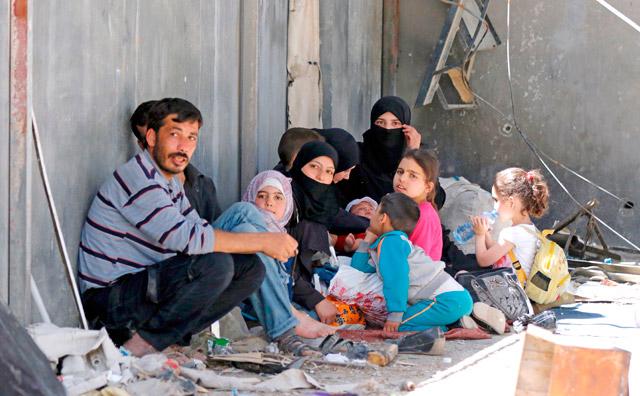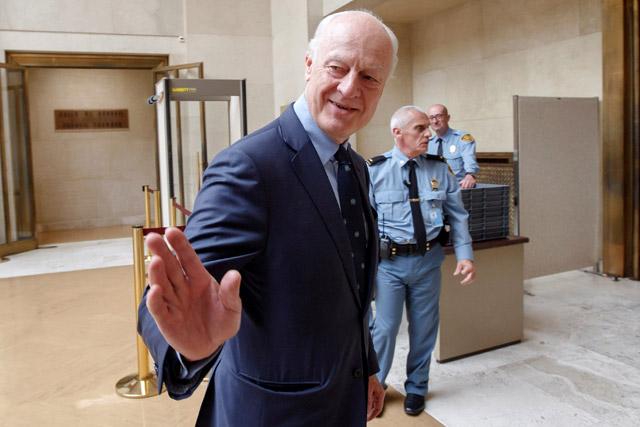You are here
Syrian rivals weigh UN plan for new constitution
By AFP - May 17,2017 - Last updated at May 17,2017

Residents of Al Qaboun, a formerly rebel-held northeastern suburb of Damascus, wait in an area designated by the Syrian government for their cases to be processed after the suburb was retaken by regime forces, on Tuesday, during a tour guided by the government forces (AFP photo)
GENEVA — Rival Syrian delegations on Wednesday weighed a UN proposal on developing a new constitution for the war-ravaged country, as a new round of peace talks entered a second day.
The sixth round of UN-backed negotiations in Geneva is the latest drive to bring a political solution to the conflict which has claimed more than 320,000 lives since 2011.
The talks opened with tensions high over a US charge that Syrian President Bashar Al Assad's government was using a prison crematorium to hide evidence of thousands of murdered detainees.
Syria's government delegation, led by Bashar Al Jaafari, returned to UN headquarters Wednesday afternoon for a meeting with talks mediator Staffan de Mistura.
They were expected to discuss his proposal to create a "consultative" committee of civil society activists and technocrats tasked with setting a roadmap to a new constitution.
The team would begin work immediately on "specific options for constitutional drafting" in order to "prevent a constitutional or legal vacuum at any point during the political transition process being negotiated", according to a copy of the document seen by AFP.
Syrian government officials did not respond to requests for comment, but a source close to the delegation confirmed they had received the document.
The opposition High Negotiations Committee (HNC) has said it has "reservations" about the draft, which was expected to be discussed with de Mistura later Wednesday.
An opposition source told AFP that the HNC had submitted a list of questions on the document to the UN, including on what "prerogatives" the new committee would have.
‘No more committees’
“This paper was a surprise — it was not expected in the first place,” the HNC’s Munzer Makhos told AFP.
“We don’t know what the aim is or how it will be implemented. We don’t want there to be more committees outside of our control.”
The UN-backed talks are expected to focus on four separate “baskets”: governance, a new constitution, elections and combating “terrorism” in the war-ravaged country.
While the HNC has insisted on Assad’s ouster as part of any political transition, the government sees this demand as a nonstarter.
The back-to-back meetings on Tuesday were brief, in line with de Mistura’s pledge to keep the talks “rather business-like, rather short”.
Hopes for a breakthrough remain dim, particularly after US claims of new regime atrocities at the notorious Saydnaya prison near Damascus.
Satellite images released by the US State Department appeared to support earlier claims by rights groups that Saydnaya is an execution centre, a claim Damascus rejected.
Relatives of detained Syrians — some of them imprisoned in Saydanaya — gathered outside the UN in Geneva Wednesday, carrying portraits of their missing loved ones and tearfully writing their names on long strips of paper.
‘Different role for Russia’
The HNC has said Washington’s accusations about Saydnaya demand a response from the United States and other friendly nations, but also called on Russia to take action.
“For us, we need to see a different role for Russia — not only helping Assad commit crimes. We need to see Russia help Syrians decide their fate and their destiny,” said HNC spokesman Salem Al Meslet.
He told journalists that members of the HNC would meet with Russian officials later in the day.
The UN meanwhile confirmed that de Misura met earlier Wednesday with Russia’s deputy foreign minister, Gennady Gatilov. Jaafari met Gatilov in Geneva on Tuesday.
Longtime regime ally Moscow has become a key player in Syria’s crisis, launching an air war in support of Assad in 2015 and brokering several agreements aimed at ending the war. The latest effort is a tripartite agreement between Russia, fellow Assad ally Iran, and rebel backer Turkey to create four “de-escalation” zones across some of Syria’s bloodiest battlegrounds.
It was signed on May 4 in the Kazakh capital Astana as part of parallel negotiations.
De Mistura has dismissed suggestions that the Astana talks are competing with the Geneva track, saying they were “working in tandem”.
Related Articles
GENEVA — A new round of Syria peace talks opened Tuesday in Geneva as the Damascus regime fiercely denied it used a prison crematorium to hi
GENEVA — Syria on Thursday accused the main opposition of taking UN-backed peace talks "hostage" over its refusal to include terrorism on th
GENEVA — In the first concrete results from talks this week on ending Syria's conflict, the United Nations said on Thursday the warring side


















